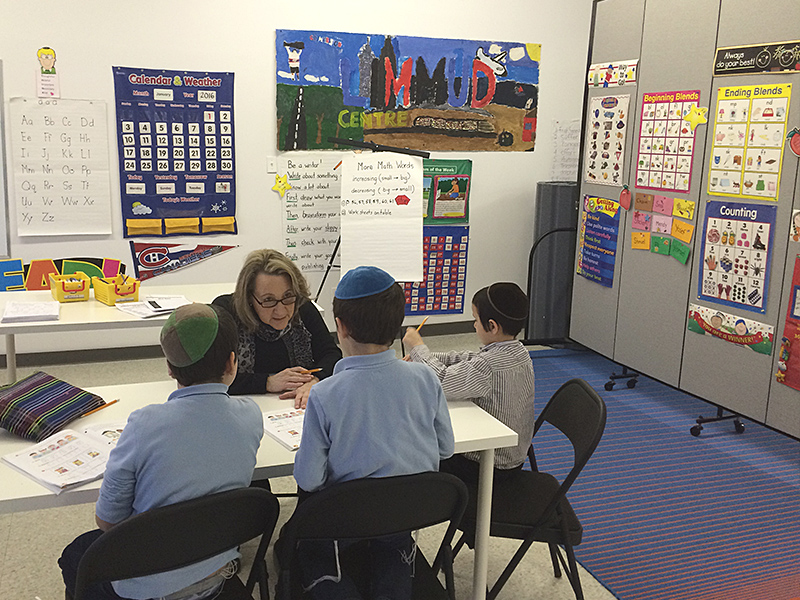MONTREAL – An important step has been taken in alleviating the long-standing issue of inadequate secular education for some chassidic boys.
At the demand of a group of parents and with financial support from Federation CJA and from individuals, an after-school program was launched in September to provide supplementary instruction in the core subjects of the province’s mandatory curriculum.
The Limmud Centre has 54 boys enrolled, kindergarten through Grade 6 students at the nearby Rabbinical College of Canada (RCC), or Lubavitcher Yeshiva.
The response was so unexpectedly great that the non-profit centre’s founder and executive director, Devorah Feldman, had to double the space she had initially set up in a modest office building on de Courtrai Avenue.
READ: NEW RULES COULD SHUT PRESCHOOLERS OUT OF CAMPS
Feldman, who was born and grew up in the Lubavitch community, is a social worker who has been concerned for some time with the welfare of youth from that community, in particular about their inability to obtain a high school diploma and apply to university.
Boys at RCC devote much of their school day to religious studies (unlike at its affiliated girls school, Beth Rivkah Academy, where students follow the education ministry’s curriculum and write the provincial matriculation exams in high school).
“We believe that boys can and should have access to solid secular education without compromising religious education and identity,” Feldman said.
She declined to say if she still identifies with the Lubavitch community, saying, “I don’t like labels.” Her three children attend the mainstream Akiva School.
Limmud is not associated with RCC, and Feldman hesitated to make any direct comment on the nature of the education there.
What she can say is that Limmud provides intensive tutorial instruction in English, French, math, science and social sciences, like history and geography. The material, however, may be modified in order to be in keeping with chassidic values.
Limmud’s staff – all female – are certified teachers with years of experience.
The educational director, Danna Dworkind, holds a master’s of education degree from McGill University, and has taught in an Orthodox boys school in London, England.
The teacher to student ratio is low, usually no more than one to five, allowing for individualized attention in a relaxed atmosphere.
Many of the same texts and pedagogical materials found in public schools are used, Feldman said.
On the walls, a visitor can see projects about Chicoutimi and a drawing of the inside of the human body, for example.
The students come to the centre immediately after their regular school day for about an hour, the older ones putting in five hours a week, the younger ones three to four.
READ: COUNCILLOR SEEKS CLARITY ON SCHOOL NUTRITION FUNDING
The program is a collaborative effort with their parents, who are expected to carry on this instruction at home for at least another hour each day. Feldman’s mission is to make government-recognized homeschooling feasible through support from Limmud.
So far, the program has been an unqualified success, according to Feldman. No child has dropped out, and attendance has been close to 100 per cent.
What’s more, she said, they are coping with their courses extremely well, even the older ones who have more to catch up on. The boys also appear to be enjoying the extra learning, despite the long day they put in.
Ongoing evaluation rather than tests are used to gauge progress, Feldman said. The approach is “reward-based.” The kids may receive gifts for outstanding work.
“We have children in kindergarten and Grade 1 who are reading already. That’s a milestone,” she said. All levels are doing well in math in particular.
Collectively, the boys have completed more than 35,000 online math questions and spent more than 500 hours dedicated to English reading and comprehension after only six months.
Limmud makes use of outside resources in the community, like the computer program at the Jewish Public Library, to supplement their classroom instruction. Extracurricular sports and recreational activities are being developed.
One mother, Rivkah, (who preferred not to have her full name published) commented: “My Mendy is engaged and shows such excitement and enthusiasm towards learning. I have such great pleasure doing homework with him. It’s amazing how much he is learning.”
Another, Sara, added: “The expertise, passion and dedication of the staff has created an ideal environment for my son and others to excel.”
Feldman’s goal is to add a grade each year until Limmud is offering a full high school program that, ideally, will equip students to write the provincial exams.
With the resources available now, she is able to enrol only a small new cohort of kindergarteners for the next school year. She hopes to also create a Grade 7, the first year of high school, but it will be limited to those now at Limmud in Grade 6.
READ: TORONTO JEWISH DAY SCHOOL TO SPONSOR REFUGEES
Rather than tuition, families pay a “membership”, but the amount is “very little” because of the outside subsidies, Feldman said.
Individuals supporting Limmud come from both inside the Lubavitch community, such as Shmuel Gniwisch, and outside, like Martin Schwartz. The Centre for Israel and Jewish Affairs is also offering guidance.
“In addition to present-day academic support, our focus is on setting the students up for long-term academic and professional success,” said Limmud board president Jonathan Chomski
